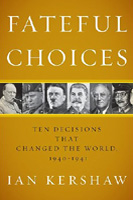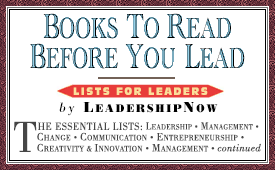
|
 |
Fateful Choices: Ten Decisions That Changed the World, 1940-1941 Ian Kershaw 
Format: Hardcover, 624pp. ISBN: 9781594201233 Publisher: Penguin Press HC Pub. Date: May 31, 2007 Average Customer Review: For Bulk Orders Call: 626-441-2024 Description and Reviews From The Publisher: In a mere nineteen months, from May 1940 to December 1941, the leaders of the world's six major powers made a series of related decisions that decided the course and outcome of World War II, cost the lives of millions, and profoundly shaped the course of human destiny from that point forward. How were these decisions made? What were the options facing these leaders as they saw them? What intelligence, right and wrong, did they have? What was the impact of personality, what that of larger forces? In a brilliant work with haunting contemporary relevance, Ian Kershaw tells the connected stories of these ten fateful decisions from the shifting perspectives of the protagonists, and in so doing rescues them from the sense of inevitability that now envelops them and restores to them a feeling of vivid drama and contingency-the feeling that things could have turned out very differently indeed. Each chapter follows the process of arriving at one decision, from the viewpoint of the leader who made it: Decision 1: May 1940. The British War Cabinet, driven by Churchill, agrees to fight on after the German blitzkrieg defeat of France, despite loud calls for negotiated settlement. Decision 2: Hitler decides to attack the Soviet Union. Decision 3: Japan decides to seize the "Golden Opportunity" and turn south, going after the colonial empires of the countries that have fallen to Hitler. Decision 4: Mussolini decides to join the war on Hitler's side to grab a share of the spoils. Decision 5: Roosevelt decides to lend a helping hand to England. Decision 6: Stalin decides he knows best and ignores all the clear signals that Germany is going to invade. Decision 7: Roosevelt decides to wage undeclared war. Decision 8: Japan decides to go to war against the United States. Decision 9: Hitler decides to declare war on the USA. Decision 10: Hitler decides to kill the Jews. Decision relates to subsequent decision, though never simply or necessarily as expected. The clash of personalities, the various weaknesses of the different political systems, the challenge of intelligence, the misdiagnosis of risk and possibility: all play their part. And after nineteen months, though much remained to be decided, the world's fate had been profoundly altered by these ten choices. Reviews Tracing the thought processes behind crucial turning points in WWII's most crucial 19 months, Kershaw, the author of a major biography of Hitler and professor of modern history at the University of Sheffield, reminds us that nothing in that titanic struggle was predetermined. Events might have run a very different course had Great Britain decided to negotiate peace with Hitler in June 1940, or if Japan had attacked the Soviet Union from the east as Germany invaded from the west in June 1941. Kershaw shows that Germany's war on two fronts and Japan's bombing of Pearl Harbor, though ultimately disastrous for those countries, were the results of chains of reasoning based on political and military goals, however despicable. Though the author makes deep, intelligent use of archival materials, he provides little new information. Rather, his analysis focuses on the structure of decision making and its consequences. Kershaw depicts Germany, Italy and the Soviet Union as severely hampered by one man giving the orders, getting input only from subordinates too fearful to say anything he didn't want to hear. The slower democratic process enabled many voices to be heard and better informed judgments to be made by Churchill and Roosevelt. This subtext adds a note of hope to a text depicting one of humanity's darkest periods. (June) —Publishers Weekly, Copyright © Reed Business Information, a division of Reed Elsevier Inc. All rights reserved.
About the Author Ian Kershaw studied at Liverpool and Oxford universities. He has taught at the University of Manchester, at the Ruhr University in Bochum, West Germany, at the University of Nottingham, and since 1989 has been Professor of Modern History at the University of Sheffield. He is the author, most recently, of Making Friends with Hitler, which won the Elizabeth Longford Prize for Historical Biography, and the definitive two-volume biography of Hitler, Hitler 1889-1936: Hubris and Hitler 1936-1945: Nemesis. The first volume was shortlisted for the Whitbread Biography Award and the Samuel Johnson Prize for Nonfiction, and the second volume won the Wolfson Literary Award for History and the inaugural British Academy Book Prize. Find Items On Similar Subjects |
|

The Essential Lists BOOKS TO READ BEFORE YOU LEAD 
Grow Your Leadership Skills NEW AND UPCOMING LEADERSHIP BOOKS 
Classic Leadership Books BOOKS TO READ BEFORE YOU LEAD |
 |
| ||
 | © 2019 LeadershipNow™ All materials contained in https://www.LeadershipNow.com are protected by copyright and trademark laws and may not be used for any purpose whatsoever other than private, non-commercial viewing purposes. Derivative works and other unauthorized copying or use of stills, video footage, text or graphics is expressly prohibited. |
||